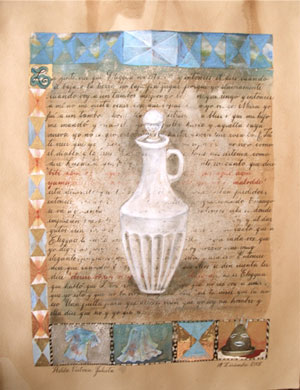Ofrenda para Hilda

Sumi Ink, metal leaf, and watercolor on paper, 17" X 22"
Hilda Victoria Zulueta, December 18, 2005. Perico, Cuba.
Hilda Zulueta was a daughter of Eleggua, the deity of the crossroads. In this fragment she explains how she might go to a ceremony in a new dress, become possessed by Eleggua, and end up ruining her dress. When the ceremony was over and she was back home, she would have no memory of what had happened and how her clothes had been ruined. The script has been partially sanded off to symbolize the loss of memory during possession. In place of the script a white bottle symbolizes the sacred space one enters during trance.
Hilda: que la gente cree que él no está ahí y entonces él dice que cuando el baja a la tierra no baja pa' jugar porque yo sinceramente cuando voy a ir a un tambor me pongo lo mejor que tengo y entonces a mí no me gusta venir con mis ropas como yo vengo. Mira yo fui a un tambor ahora días y me estrene una blusa que mi hijo me mandó y cuando yo vi aquella blusa y aquella saya nueva yo no se que color tenían, hasta ahora luce rosada. ¿Tu te crees que yo quiero echar a perder mi ropa? Si yo vivo como el diablo y la cruz. Entonces Eleggua tiene un sistema como dice ella que Eleggua le dice que cante ese canto que dice 'bibi agui agui agui yamama lodde, bibi agui agui agui yamama lodde ajoro topo ero llamalo ya, llamamalodde' está diciendo que Changó y todos los santos están perdidos, entonces cuando Changó ve la candela, porque cuando Changó se va a presentar ve como una candela y entonces ahí es donde empiezan todos los santos a…porque Changó da gritos y al dar gritos viene todo el mundo. Como también hay otro canto que a Eleggua le gusta cantarlo mucho dice ella porque cada vez que yo digo, no porque yo si no me voy a subir hoy porque vine muy elegante, porque yo no se que, porque no estoy para eso. Entonces dice que cuando Eleggua viene para que ellos se den cuenta les dice 'oberere oberere maifoduno balewa obanua…ese es Eleggua que habló que Dios no castigó que no me voy a subir, que yo esto y que no lo otro. Eleggua dice ah tu dices que tu no eso. Una pulla para que ustedes vean que yo soy un hombre y ella dice que no y yo que si….
Hilda: People believe he is not really there, but he says when he comes down to the earth it's not to play around. And sincerely, when I go to a tambor (ceremony) I put on the best clothes I have, and then I don't like the way they are when I get home home. Look, I went to a tambor some days ago and I wore a brand new blouse my son sent me, and when I saw that blouse and that skirt I don't know what color they used to be, but to this day they look rose colored. Do you think I want to lose my clothes? If I were a devil on the cross. So then, Eleggua has a system. Eleggua says to sing this song: "bibi agui agui agui yamama lodde, bibi agui agui agui yamama lodde ajoro topo ero llamalo ya". It'ssaying that Chango and all the santos are lost, and then when Chango sees the fire,(because when is going to present himself you see him as fire) that is when all the saints start to…because Chango screams, and when he screams everybody comes. Also, there is another song that Eleggual likes to have sung, but every time I say no, I don't want to go into trance today because I came looking very elegant, because I don't know…I don't want to go there…so then they say that when Eleggua starts to come they notice, and they say,"oberere oberere maifoduno balewa obanua…this means Eleggua spoke, that god didn't punish him, and that I don't have to go into trance, that I… this and not that. Eleggua says, "Ah, you say not that…an insult because you people see that I am a man… she says no, and I say yes"…









